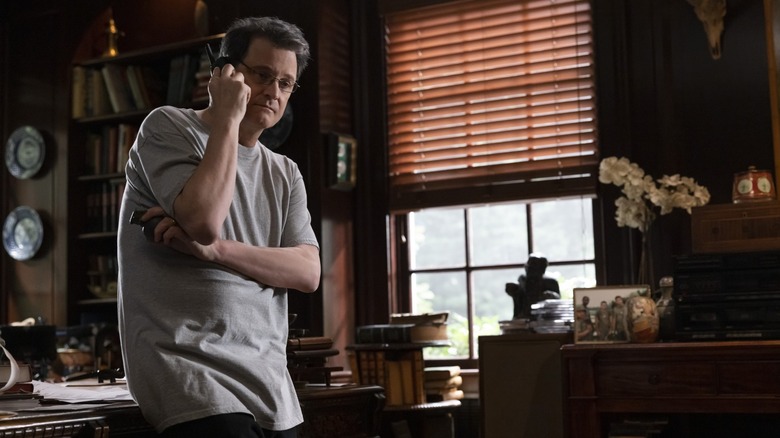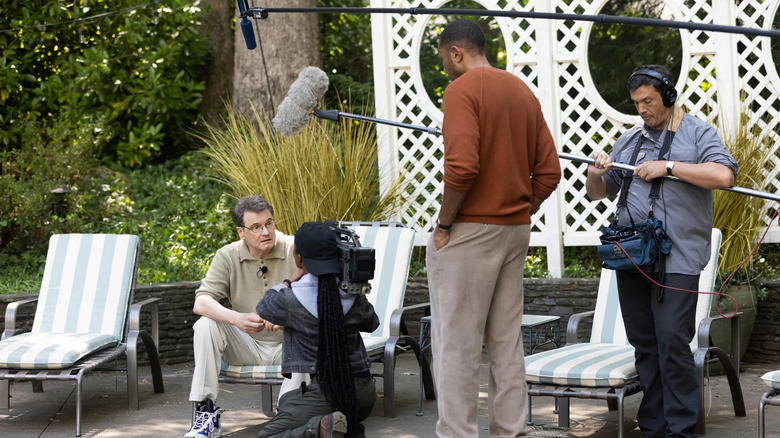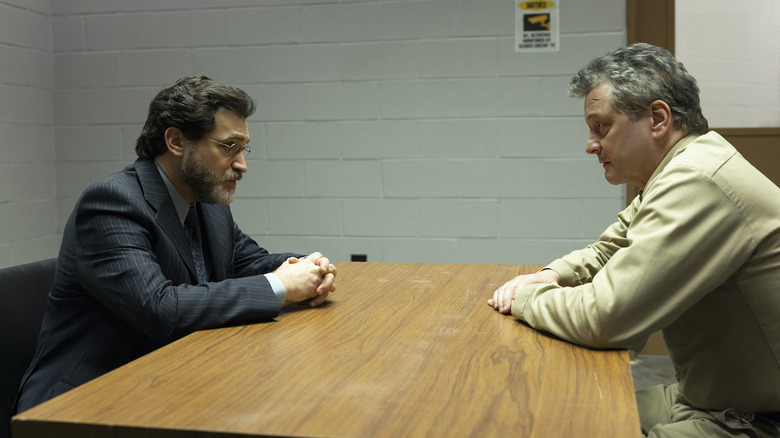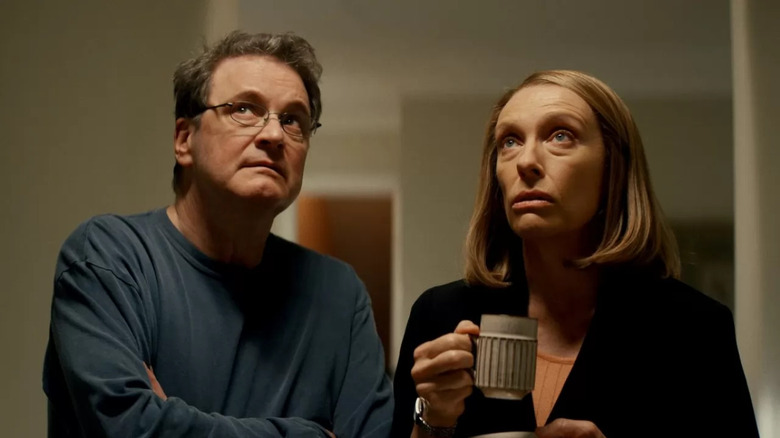The Staircase Creator Antonio Campos Discusses Depicting Kathleen, Casting Colin Firth, And The Owl Theory [Interview]
"The Staircase" episode 5, titled "The Beating Heart," portrays the finishing touches in editing the famous documentary of the same name. The filmmakers are at odds. Following the guilty verdict for Michael Peterson (played by Colin Firth), the artists debate what is and isn't important to telling his story and what does and doesn't tip the scale towards innocence or guilt. It's a fine line to walk that creator Antonio Campos and all involved in HBO Max's "The Staircase" continue to walk well.
There's a certain meta quality to the episode we discussed with Campos. Thus far, the show has reignited conversation about the case that goes beyond the question of guilt. For Campos, that was the intention. "I think that people are having conversations about the show that go, "Oh, this is a true crime show," but you're not talking necessarily about the same things you talk about when you talk about the majority of true crime," he told us. "There's so much to this genre that there is to explore and to deconstruct. It's exciting for me to know that people are having these conversations, and that the things that we intended to come across are coming across." Recently, the director behind "Christine" and "The Devil All The Time" talked to us about "The Beating Heart," casting Colin Firth, and questions he wants the series to raise.
'A Greek chorus in this story'
How did Dashboard Confessional's "Vindicated" end up in this episode?
[Laughs] Through the persistence of [music supervisor] Randy Poster. We debated a lot about which song. Randy, who I've worked with a bunch, said "Vindicated." It was really a deep cut for us, even though it was popular at the time. It just got into our ears and made its way into my brain and wouldn't get out. Now, it's in the show.
Bold choice.
Randy was like, "I feel vindicated," and walked out the room.
Behind-the-scenes, are you having conversations like the documentary filmmakers in this episode? Are you questioning how much screen time to give certain information?
We're constantly navigating that. You may have different feelings about Michael Peterson, but you're also trying to write a scene in which you want to be on his side because you want to feel the way that people in the room feel, which is on his side and you want to empathize with him. You're constantly navigating that as the storytellers.
As documentary filmmakers, they're to create as unbiased a portrait of Michael Peterson of the story as they can, though they have their personal feelings and they're working with footage of the real people. It gets tricky and what we were highlighting was that documentary storytelling is another form of storytelling and requires decisions to be made by those storytellers, in order to take you on a journey.
That doesn't always mean that getting the whole picture; you're getting a picture that's been constructed by them using real elements. They are trying to give something that's as close to the truth that they feel, whatever the truth is that they're trying to tell. But you have different opinions. I watched the documentary in 2008, and I was struck by the idea that there was a French film crew that was in Durham, North Carolina in this house. I got excited by that as a device in a story, because I knew that the two filmmakers had two very different opinions about what happened.
I knew that would offer a dialogue, a Greek chorus in this story that could capture the dialogue that was happening by the audience's conversation that was happening. So, from the beginning I knew that dynamic was going to be a big part of the story. One of the first scenes that I ever imagined was, these filmmakers in their office in Paris, having this debate about Michael Peterson and debating all the things the audience were debating, but with higher stakes, because they're telling the story.
Do you also often debate, for example, how long do we let this shot of Peterson go? Those little but major moments that could maybe tip the scale for how an audience feels?
There's definitely conversations like that. There's definitely conversations where we're looking at a performance and we're going, this moment feels like it tips the audience into feeling one way or another, and we don't want the audience to feel that way at this moment. So we look for a different take, or we mix sound from another take with a picture from another take and you create a whole different performance. You're trying to be in touch with your own feelings about it. At a certain point, you're also aware that your emotional response is not the same as it was when you first started, because you've seen it so many times.
You've entered a phase of intellectual response, and sometimes that's why it's helpful to have other people in a room who haven't seen it because you can get their emotional response. And then you're trying to guess when you don't have that in the moment, you try and guess what an audience is feeling and how they're going to feel based on all the other building blocks that you've laid out before that moment.
'We just had to create our version of Michael Peterson that worked within our story'
You've spent years working on this, reading about the case, about Peterson and I imagine maybe your take on the story or what happened changed throughout it, right?
Oh, 100%. In the very beginning, I had a very strong feeling about that. I would go back and forth all the time and some new piece of information would come my way and then I would take into account and reconsider what I had thought before. But then I just stopped thinking so much about it, and I just started thinking about the whole story, and I just started thinking about everything around that night and that's what the series came out of, stopping the process of thinking that I was going to solve it and more being open to the process of going on this journey.
The series is in a lot of ways an attempt to try and recreate my experience having spent 14 years with it, because when I started there was one very clear ending, which was, he was in prison for life. And then about two years later, that changed. And then, six years later after that, there was another ending. And so, it was constantly evolving and I had to let go of that like, "Did he or didn't he do it?" I had to just see how everything unfolded.
Ultimately, even during the process of writing it, in the writer's room, we debated constantly and you would see in real-time, literally someone would start the session feeling one way, very adamantly feeling one way, and then by the end being like, "You know what? I don't know anymore ..." We embraced that and we knew that someone might be writing a script where in their gut they felt Michael Peterson was guilty or strongly believed that he was innocent. The contradictions were okay. The complexity of that, the complications of that, we embraced it, because that's so much of what this story is.
I allowed myself through the course of making it to be open to seeing, as we did these depictions, to see how I felt. I did start the journey feeling one way and I ended the journey feeling another way. At the end of the day, I hope that it's not all about what he did or didn't do for people, because it is inherently the mystery here that we're all obsessed about. I hope that you have a feeling about one version of events or another, but know that you have to be okay with the gray at the end.
Colin Firth's casting is interesting in that regard. It doesn't look like an accident that such a lovable actor was cast in this role.
That was when we thought of Colin, that was a really interesting dynamic that the audience would come in with. It complicates the audience's relationship with that character. There is a version of Michael Peterson that you come in and you just immediately feel, "Oh, he's ..." He's a very polarizing figure, even in the documentary. We had to make the story work for people that didn't know anything about the documentary, people that knew the documentary well, people that knew something about the case but weren't as fanatic about it as a lot of people. We just had to create our version of Michael Peterson that worked within our story.
We didn't try to replicate anybody. It was important nobody was impersonating any of the real people. The direction was okay, there's all this footage, there's all this material. There are podcasts, there's interviews, whatever. Take what you want, take as much or as little as you want that works for you, and then the rest should just be you and what you bring to the table. Let's find the place where you and this real person meet in that sweet spot, and that was the mandate. With Colin, it wasn't like, "Well, you have to do the voice this way."
It was really like, the voice is part of the character. It's this part of this person, the way he talks — it's in the writing, but you can do your version of that. Also, it's a texture, it's a really good texture to work with. A lot of times when I watch these actors work, what they're doing is they're trying to tap into what's going on inside, but other times, they tap into an external quality: the way they speak, the way they move, or the way they even present themselves the way they look. They use that to inform the internal work.
Back to your original question, the idea of casting Colin was one, he's a brilliant actor, and two, never really seen him do anything like this, but you know he could do an incredible job with it and capture all the complexities that we are trying to convey with this guy, and three, it's a benefit audiences have very warm feelings about him in the public.
'I leave it up to the audience'
How'd the grenade become such a visual metaphor in the series?
Vietnam's very important to Michael and that object, a diffused grenade, was this stress ball for the character and it kept coming back. The potential for danger, a grenade, it's either just sitting there and completely harmless. But if you pull the pin, it'll kill you. And so, there's an aspect of Michael Peterson where he's completely harmless, but is he? If you pull that pin and you use it, if you push the right button there or the wrong button, what happens?
So, it just speaks to the volatility of character and touches on this time in his life that really shaped him. In our conversations with the real Michael Peterson, throughout the documentary, and in his writings, he talks a lot about Vietnam. Even in the show, you see him get incredibly emotional when he talks about that experience. So yeah, we always knew that item was this totem that we had to keep coming back to.
How extensive were your conversations with Michael Peterson?
Oh, we never talked about the show itself with him. He didn't know anything about the show, but he knew that we were doing the show. We were open to speaking to anyone and everyone who would agree to speak to us and Michael did and we spoke. We had a couple long conversations. He's very much like the way he appears to be in the documentary. I would say that there were little nuggets, things that came out of that conversation that then made their way into the story, but ultimately, it just reinforced what we were already doing. It was interesting to have a conversation with him, but I don't think it necessarily changed the direction of anything.
You introduce the owl theory towards the end of episode 5. How deep does the show go into that theory?
In the next episode, it's going to be explored. It was a theory that caught my attention early on, because I think the majority of people that hear the theory, their reaction is to dismiss it at first and then to have their interest peaked and to then entertain it. There is something about that, that to me said so much about this case and the unknown, that it's such a mystery that for a second, you can even believe that an owl will swoop down from the ground and attack Kathleen that night.
When you start to break it down and you look at the different pieces of evidence that Larry Pollard put together with Sophie, there are elements, it is an interesting theory, and we felt like we had to entertain it and we had to treat it as seriously. There was a character in our story that believed it deeply. We had to accept that and follow that and see where that led. I don't know with all these unsolved cases, cases where even if there's a conviction, there's a lot of big questions. You do find that there's that theory, there's that outlier freak theory, that answers the things that have been unanswerable. I think that's what the owl theory does, but I don't know .... Again, with all these things, I leave it up to the audience.
We intentionally leave all these things up to the audience. What we did was we tried to make each one as convincing as the other. There wasn't like, "Oh, this theory, we don't buy this theory. Let's just let it reflect that, that we're not 100% convinced." It was like, "No, we have to treat this as though this is how it could have happened if it happened this way." We constructed the entire narrative so that any one of these things was possible.
How'd you want the show to be respectful in its portrayal of Kathleen and the loss of her life?
There is a void in the doc, which is her. I think in a lot of true crime stories where there's the deceased, they just remain this ghostly figure that haunts the whole thing, but they don't really have any voice. In the case of Kathleen, I've only seen a few words uttered in home video footage and we dug as deep as we could to learn as much as we could about her. With Toni, it was like there was no one else who could bring all the complexity and dynamism that we needed for Kathleen to come to life.
We only saw her in very big turning points, but it just felt like we needed to be with her in little moments for going to the bathroom and taking medicine or, getting ready for work, her driving to work, her just sitting in her office checking emails, taking a phone call, her having a drink at night with Michael, making dinner, all these just intimate moments with someone. We wanted to try and create a version of her that felt truthful to us and felt human. I would say that we had a lot of fun writing her as a character. I think this comes across in the show, we loved her as a character.
She was played with a lot of love by Toni who felt a great responsibility playing someone who died so tragically and who was loved by so many people. There were lots of conversations about how to be respectful, but also complicate her. Make her a human being and bring her to life. In episode 5, there are these wonderful moments with her, her at that dinner with Michael and the family friends, or in episode 6, you're going to see stuff with her and her family as well. And then by the end, some of my favorite moments in the show are with her. I hope that aspect of the story is as emotional for the audience members as it was for us creating it.
"The Staircase" is now airing on HBO Max.



